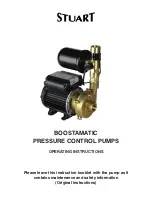
17
|
Piping installation
Installer and user reference guide
86
R R8T7V1B
VRV IV heat pump for indoor installation
4P499898-1A – 2020.10
NOTICE
Wait until the compressor unit has finished the initialisation to apply setting [2‑21].
Leak test and vacuum drying
Checking the refrigerant piping involves:
▪
Checking for any leakages in the refrigerant piping.
▪
Performing vacuum drying to remove all moisture, air or nitrogen in the
refrigerant piping.
If there is a possibility of moisture being present in the refrigerant piping (for
example, water may have entered the piping), first carry out the vacuum drying
procedure below until all moisture has been removed.
All piping inside the unit has been factory tested for leaks.
Only field installed refrigerant piping needs to be checked. Therefore, make sure
that all the compressor unit stop valves are firmly closed before performing leak
test or vacuum drying.
NOTICE
Make sure that all (field supplied) field piping valves are OPEN (not compressor unit
stop valves!) before you start leak test and vacuuming.
For more information on the state of the valves, refer to
17.3.2 Checking refrigerant piping: General guidelines
Connect the vacuum pump through a manifold to the service port of all stop valves
to increase efficiency (refer to
"Checking refrigerant piping: Setup"
NOTICE
Use a 2-stage vacuum pump with a non-return valve or a solenoid valve that can
evacuate to a gauge pressure of –100.7 kPa (−1.007 bar)(5 Torr absolute).
NOTICE
Make sure the pump oil does not flow oppositely into the system while the pump is
not working.
NOTICE
Do NOT purge the air with refrigerants. Use a vacuum pump to evacuate the
installation.
17.3.3 Checking refrigerant piping: Setup
The system contains 2 refrigerant circuits:
▪
Circuit 1:
Compressor unit → Heat exchanger unit
▪
Circuit 2:
Compressor unit → Indoor units
You have to check both circuits (leak test, vacuuming drying). How to check
depends on your available tools:
















































